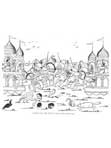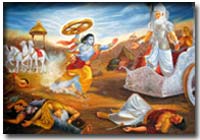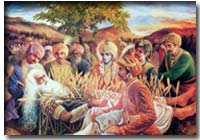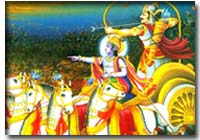GETTING READY FOR THE BATTLE
 |

The sages of heaven welcomed him reciting the vedic hymns. Arjuna bowed to Indra who seated him on the throne along with him, an honour rarely conferred on any individual. He was lodged in a palace built with precious stones. The Gandharva bands provided him with musical entertainment. He was taken through in a procession on the 'Airavata', the white elephant of Indra through the main streets of heaven and he spent some time in the renowned Nandana park, where the Kalpavriksha, the tree which fulfilled all desires, grew. He paid his respects to the celestial cow, 'Kamadhenu' and took the holy bath in the Mandakani, the divine counterpart of the Ganges. At sunset, Arjuna returned from the Nandhana park to the palace of precious stones reserved for his stay. He stood on the balcony observing the rising moon, a sight which angles loved to see every day.

Arjuna quickly came to the door way and received Urvasi with all the reverence at his command. He bowed to her and welcomed her in the traditional style saying, "This is humble Arjuna,paying respects to the revered Urvasi, the great grandmother of the royal race of the Bharatha." Urvasi was taken aback at the way the renowned hero received her, recollected her wits and replied, "This is the land of eternal spring and grandmother do exist here. Here men are aged thirty and girls sixteen forever. Attracted by your renowned valour, I have come to you as a Jyotsna abhisarikas. I expect you to be a chivalrous sportsman." Arjuna said, "Mother you were the wife of Pururava, the illustrious ancestor of our dynasty. I request you to bless me, your grandchild. Urvasi said, "Here you should not be contaminated by the mundane mentality which is incompatible with the practices in Paradise. Terrestrial relationships are not relevant to transcendental bliss and beautitude. You are a hero. I am the celestial damsel." Arjuna replied, " A hero is not expected to be a slave of carnality. If this is your palace, I should like to abide by earthly values. A mortal who conquers himself is greater than the hero who conquers the whole world." Urvasi, in utter humiliation and despair cursed Arjuna, "You will then live as a eunuch in the mortal world, devoid of your manliness, preoccupied with menial pursuits."

Indra trained Arjuna for four years in the use, upkeep and security of superhuman missiles he gave to Arjuna and presented him with the celestial conch, which was named Devadatta, meaning a gift of the Gods and a golden crown studded with precious stones. The king of the gods said to Arjuna, "Gods have their own peculiar problems. We are facing constant trouble at the hands of Nivatakavachas, who have built a submarine kingdom. Their population is about three crores and are invincible to the immortals. As gurudakshina I want you to conquer them." Arjuna started on the chariot of Indra driven by Matali. It was drawn by ten thousand horses of various hues- some having pure white swan skins and others with peacock feather colours.
Arjuna reached the great ocean and blew the Devadatta at the submarine city gates. The Nivatakavachas hordes came in waves and attacked Arjuna. In the epic, a detailed description of the great battle is given. The demons hurled various missiles at Arjuna creating artificial cyclones, darkness, etc. It was atmospheric warfare. Matali, the divine charioteer swooned and Arjuna himself piloted the chariot and fought with the Danava hordes simultaneously countering all their missiles. Eventually Arjuna destroyed the demons. Matali told Arjuna that two Asura women, Puloma and Kalaka obtained boons from Brahma by their austere penances so that their progeny, the Paulomis and Kalakeyas, should become invincible by the immortals, and that their city Hiranyapura was in the vicinity. They numbered sixty thousand. Arjuna asked Matali to drive the chariot to Hirayapuri. The demons who were awaiting Arjuna, attacked him with all their might. A fierce battle followed. Arjuna released the Pasupata missile and the surging hordes Kalakeyas and Paulomis were reduced to ashes. Arjuna returned to Indra triumphantly.

